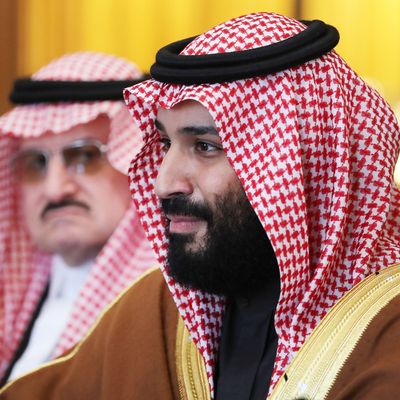
Saudi Crown Prince Mohammed Bin Salman is responsible for the “the worst manmade humanitarian crisis of our time.” His government (with the help of ours) has been bombing and starving Yemen for three years now, in a bid to prevent a Shia-led group from taking power in that country. He has overseen missile strikes on hospitals, schools, and funerals. He maintained a blockade of Yemen that restricted its access to basic necessities. As a result, 1.8 million Yemeni children are acutely malnourished, while 400,000 are so severely underfed as to be at high risk of imminent death. He has also imprisoned more than 200 prominent Saudis, without trial, at the Ritz-Carlton in Riyadh. At least one has (reportedly) been tortured to death.
And much of the American press has greeted him as a liberator. In the New York Times last November, Thomas Friedman hailed the ascension of the 32-year-old prince as “Saudi Arabia’s Arab Spring.”
There is some basis for regarding “MBS” (as he’s commonly known) as a reformer. He has given Saudi women permission to drive, and has has publicly challenged the core convictions of Islamist fundamentalists, telling Friedman that “at the time of the Prophet Muhammad … there were musical theaters, there was mixing between men and women, there was respect for Christians and Jews in Arabia.”
Still, to understand the level of enthusiasm among the American elite — for an unapologetic autocrat who has engineered a famine in the Middle East — you need to understand how thoroughly amenable MBS is to America’s foreign policy aims in the region; which is to say, how thoroughly the crown prince is onboard for aligning with Israel in a grand coalition against Iran.
In an interview with The Atlantic’s Jeffrey Goldberg this week, MBS made this position clear — by saying that Israelis had a right to “their own land,” and that Iran’s ayatollah Ali Khamenei “makes Hitler look good.”
“I believe the Palestinians and the Israelis have the right to have their own land,” the crown prince told Goldberg. “But we have to have a peace agreement to assure the stability for everyone and to have normal relations.”
Asked about anti-Semitism in Saudi society, MBS pointed out that some of his prophet’s best friends were Jewish.
“Our country doesn’t have a problem with Jews,” he said. “Our Prophet Muhammad married a Jewish woman. Not just a friend — he married her. Our prophet, his neighbors were Jewish.”
Nevertheless, MBS’s great love for the Jewish people did not prevent him from asserting that Iran’s supreme leader — who has never tried to exterminate his nation’s more than 10,000 Jewish residents, nor to shutter their dozens of synagogues — is worse than Hitler.
“I believe that the Iranian supreme leader makes Hitler look good,” the crown prince said. “Hitler didn’t do what the supreme leader is trying to do. Hitler tried to conquer Europe. This is bad … But the supreme leader is trying to conquer the world. He believes he owns the world.”
There is no serious case that Iran has comported itself as a more expansionist power than Hitler’s Germany (in fact, it has comported itself as a much less expansionist power than George W. Bush’s United States). And in domestic terms, it would be hard to argue that Iran’s regime (however oppressive and unjust) is more totalitarian than Saudi Arabia’s.
But MBS is happy to play nice with both Israel and various American business interests. And so engineering the mass starvation of Yemeni children will not cost him the title of “reformer.”






























